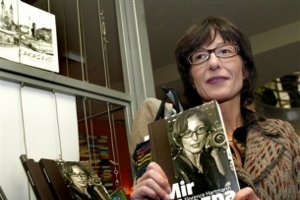 In many respects, the International Criminal Tribunal for the former Yugoslavia is a groundbreaking institution. Founded in The Hague by the United Nations 16 years ago to prosecute perpetrators of genocide, war crimes, and crimes against humanity during the brutal civil war in the Balkans, the ICTY was the first war-crimes panel to be created since the Nuremberg and Tokyo tribunals some 60 years ago.
In many respects, the International Criminal Tribunal for the former Yugoslavia is a groundbreaking institution. Founded in The Hague by the United Nations 16 years ago to prosecute perpetrators of genocide, war crimes, and crimes against humanity during the brutal civil war in the Balkans, the ICTY was the first war-crimes panel to be created since the Nuremberg and Tokyo tribunals some 60 years ago.
But now it’s breaking more sinister ground. The tribunal is prosecuting a French journalist it accuses of publishing unauthorized information about its own proceedings. If convicted, Florence Hartmann, 46, faces a possible prison sentence of seven years and a maximum fine of 100,000 Euros, or about $126,000 at current exchange rates. [See the Congress of North American Bosniaks press release]
Hartmann covered the civil war for the French daily Le Monde and served from 2000 to 2006 as the spokesperson for the tribunal’s then-chief prosecutor, Carla Del Ponte. She has been an energetic champion of the tribunal’s mission.
Last August, however, it indicted her on two counts of contempt for knowingly and willfully revealing confidential information to the public relating to the tribunal’s case against Slobodan Milosević, the former Serbian leader who died in his cell in 2006 before the end of his trial for war crimes and genocide.
The indictment cites her discussion of two confidential tribunal decisions in three offending pages of her 2007 book, “Peace and Punishment,” and an article she wrote in early 2008 for the Bosnian Institute.
Hartmann’s lawyers, friends, and associates claim, first, that the information she published was already available to the public, and second, that the public had a right to know about how the tribunal had handled the case against Milosević.
Hartmann’s real crime, they assert, was embarrassing the tribunal by writing about how and why its judges decided to withhold evidence from the International Court of Justice (a permanent court also located at The Hague) that might have linked Serbia to numerous wartime atrocities, including the infamous massacre of 7,500 Bosnian Muslims at Srebrenica in 1995.
In her book and her article, Hartmann criticizes the tribunal’s decision to accept military documents from Belgrade in exchange for a pledge that some of the material would not be turned over to the International Court of Justice without being redacted.
Bosnia had sued Serbia for genocide in the International Court, which ruled in February 2007 that, while the massacre of Bosnian Muslims at Srebrenica in 1995 qualified as genocide, there was insufficient evidence to conclude that Serbia was guilty of the crime.
But the court’s judges never saw the uncensored copies of the documents that the tribunal had obtained from Serbia. The ruling, which caused an uproar, effectively absolved the Serbs of having to pay enormous damages to the families of Bosnian Muslim victims.
Hartmann stresses that she did not disclose the contents of any of the material that Serbia had turned over to the tribunal. What she appears to have disclosed, she says, was how Serbia successfully argued that concerns about its national security interests should prevent the tribunal from sharing this material with the International Court of Justice and the public.
The tribunal’s indictment of Hartmann has stirred outrage. Hartmann’s defenders decry the tribunal’s expanding its prosecutorial authority to issues of free speech. More than 2,500 people have already signed protest petitions, and several journalists and human rights groups – among them, the London-based Article 19 and the Paris-based European Journalists Association – have urged the tribunal to drop the charges.
It’s not clear when Hartmann’s trial might start. The tribunal is scheduled to complete its trials by 2010 and hear all appeals by the end of 2011. Its action against Hartmann suggests that freedom of expression might best be protected by advancing that schedule.
Judy Miller is a contributor editor with City Journal, published by the Manhattan Institute. This article is adapted from the Spring issue.
